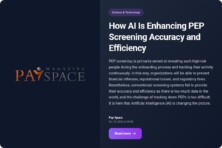Artificial intelligence and machine learning are revolutionizing the mortgage lending industry, paving the way for a faster, more efficient lending process. By analyzing vast amounts of data, these technologies can identify patterns and make predictions that traditional underwriting methods may miss. This can lead to more accurate risk assessments and ultimately, better loan decisions.

However, with all the benefits come concerns. One of the major concerns is the potential loss of jobs as more tasks are automated. Although the use of AI and machine learning can streamline the lending process, it could also lead to fewer jobs for underwriters, processors, and other mortgage professionals.
Another concern is the potential for bias and discrimination. Machine learning algorithms are only as objective as the data they are trained on, and if that data is biased, the algorithm will be biased as well. For example, if a lender uses historical data that shows that certain minority groups have a higher default rate, the algorithm may be more likely to deny loans to those groups in the future, perpetuating the cycle of discrimination.
Overall, while AI and machine learning offer many benefits, it is important to be aware of the potential drawbacks and work to address them in order to create a more fair and equitable lending industry for all. This means ensuring that algorithms are trained on unbiased data and that there are measures in place to protect jobs in the industry.
Important note before we go to the body of this article: all-important human jobs can’t be replaced by artificial intelligence. OK, after this little “disclaimer” we can look deeper into the matter.
How AI Will Influence the Mortgage Industry

It’s just a matter of time when AI will be fully integrated into the mortgage industry. So let’s point out a few areas where it might influence this industry the most.
- Customer service. Artificial Intelligence (AI) is revolutionizing customer service by providing unmatched insights into customer needs and expectations. AI-powered customer service bots working in tandem with human representatives can provide round-the-clock customer support, leading to faster, more efficient resolution of customer issues and enhanced customer retention in the long run. Additionally, AI solutions can analyze vast amounts of customer data with lightning-fast speed, enabling them to provide tailored solutions that more accurately reflect customers’ needs. This capability not only mitigates customer frustration, but also increases customer engagement and satisfaction with the brand. By leveraging AI to enhance customer service, businesses can gain a competitive edge in the marketplace and establish long-lasting relationships with their customers;
- Cybersecurity. As computers become more sophisticated, cybersecurity is becoming increasingly crucial. AI can assist in this regard by identifying cybersecurity dangers faster than humans and preventing them more effectively. AI can identify potential threats before they occur by processing data more quickly and detecting any anomalies that may indicate a threat. This enables cybersecurity professionals to take measures to safeguard systems against attacks such as malware or phishing scams. AI can also constantly monitor security and automatically adjust without the need for manual intervention;
- Mortgage technology services. Artificial intelligence (AI) is increasingly being used in the mortgage industry to make processes more efficient and automated. Mortgage lenders are now able to use AI to process large amounts of customer data, which allows them to make decisions faster. Machine learning algorithms can also be used to pre-qualify clients faster and automate time-sensitive mortgage processing tasks. With the use of AI technologies, mortgage lenders can reduce the time it takes to process applications and the costs associated with manual labor. This provides opportunities for improved efficiency, quality outcomes, scalability, and profits for mortgage brokers;
- Mortgage underwriting. Artificial intelligence (AI) has transformed the underwriting process. It provides underwriters with a quick and efficient means of assessing the credit background and financial stability of potential borrowers. Using AI reduces underwriting decision time from weeks to minutes, which, in turn, reduces labor costs and creates a streamlined process for homebuyers. The traditional method of manually underwriting every loan is no longer as necessary, as AI underwriting increases the ability of financial institutions to accurately assess the risk level of each mortgage applicant, reducing their risk exposure and mitigating fraud or errors. AI has greatly increased access, speed, and accuracy for lenders engaged in underwriting mortgages;
- Mortgage borrowers. AI algorithms are frequently utilized to expedite and enhance the mortgage application process for borrowers. Additionally, AI chatbots enable borrowers to access information and initiate loan applications directly from their mobile devices at any time. By combining traditional processes with modern technology, AI is assisting borrowers in obtaining better rates in a fraction of the time it would normally take. Ultimately, AI is simplifying the process of achieving financial goals for borrowers, while also providing them with the best available rates.
How Artificial Intelligence Is Changing Mortgage Lending
Artificial intelligence (AI) is a game-changing technology that has the potential to revolutionize the lending industry. By streamlining the loan application process and providing more accurate risk assessments, AI can save time and resources for both borrowers and lenders. With AI’s ability to quickly confirm a borrower’s information, loans can be approved in a matter of minutes, providing borrowers with the funds they need without the hassle of a lengthy application process.
But that’s not all. AI’s potential to combat mortgage fraud is one of its most significant advantages in the lending industry. By analyzing patterns associated with fraudulent activity, AI can help lenders to detect and prevent fraudulent loan applications from being approved. This not only protects the lender but also helps to prevent borrowers from falling victim to fraudulent lenders.
In addition, AI has the potential to increase competition in the mortgage industry, which could ultimately result in lower borrowing costs for consumers. With the ability to offer more accurate risk assessments and simplify the loan application process, AI could enable new lenders to enter the market and compete with established lenders. This competition could result in lower interest rates and fees for borrowers, making it easier and more affordable for people to get the loans they need.
Moreover, AI’s potential to evaluate risk more accurately can lead to lower interest rates for borrowers who are less likely to default on loans and larger loans for those with high debt-to-income ratios. This means that even those who might not have qualified for loans before could now have access to the funds they need to achieve their goals.
Overall, AI’s potential impact on the lending industry is immense, and its benefits are far-reaching. By simplifying the loan application process, combatting mortgage fraud, and increasing competition, AI could make it easier and more affordable for people to access the funds they need to achieve their dreams and build a better future for themselves and their families.









